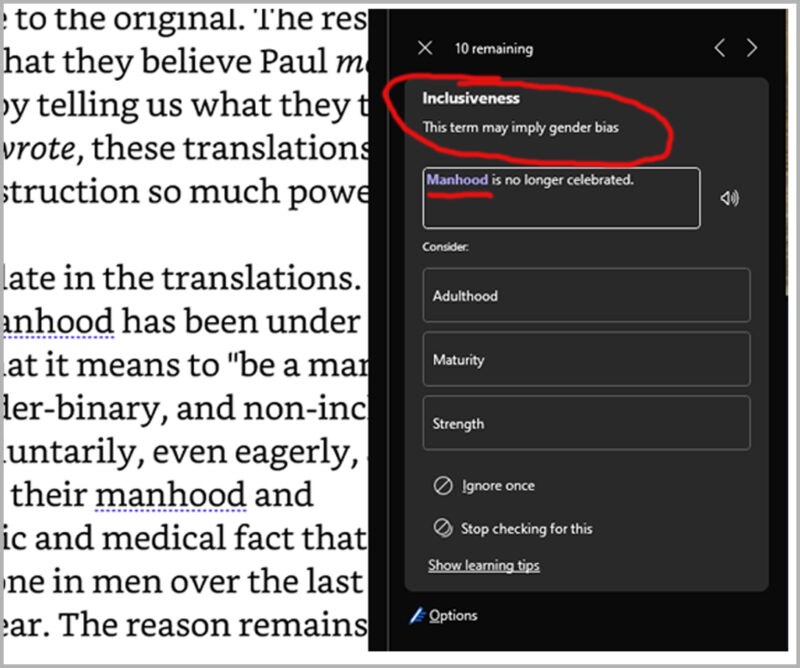This is a stratagem of the enemy, to keep us so consumed and vexed with the personal cares of this world that we have no time or energy to devote to the larger spiritual needs of this world, and of the Body of Christ.
It does not help that we often find important Scriptural texts filled with prophetic insights, precious promises, important encouragements, and urgent commands that are buried in archaic language that fails to communicate clearly to the modern reader in such a way as to inspire us to pay attention and take action.
We find such a phrase in this rather unusual admonition from Paul as he concludes his first letter to the Corinthians: “Quit ye like men.” It is a phrase that makes sense in King James English but seems cryptic to the modern ear, and this is but one element in a five-part staccato of urgent commands, including: Watch, stand fast in the faith, be strong, and do all things with love.
What does it all mean? We will examine those commands in this article and get to the bottom of the real idea of what it means to “quit ye like men.” Because the threat is dire, and the need is as urgent as ever, considering that these exhortations from the Holy Spirit were given nearly 2,000 years ago and are just as applicable to us now as they were to the believers then; in many ways (as you will see) they are even more applicable.
And, while this message is intended for all Christians, it is particularly directed towards the men – my brothers in the Lord. But it will certainly benefit the women to know exactly what men are up against.
Let us look at these five exhortations and examine them individually.
1. “WATCH YE”
Typically, watching and praying are mentioned together, as in “Watch and pray, lest you enter into temptation” (Mt. 26:41). These spiritual activities do tend to go together, but we have more examples of prayer than we do of actual watching. What does it mean to watch? The Greek word here is grēgoreō. It means to be awake. In the military, to keep or to set the watch means to stay awake during the night (usually in shifts) and keep an eye out for danger while the rest sleep. It means to be alert, to be vigilant, to be on guard. Metaphorically speaking it means to pay attention, to be cautious, to take heed.
Why should we watch? The idea is to see danger coming from afar and to not wait for the danger to threaten us up close or to catch us unawares. Watching is a proactive measure designed to anticipate problems and deal with them before they threaten too closely. In a prophetic sense, to “set a watch” was to get the mind of the Lord concerning a serious situation and then declare God’s intention to others: “Go, set a watchman, let him declare what he sees” (Isa. 21:6). The watchman on the wall was responsible for staying awake during the night while the city slept and warning of any enemies that approached.
The Greek work grēgoreō is the same word translated “vigilant” in 1 Peter 5:8: “Be sober, be vigilant; because your adversary the devil walks about like a roaring lion, seeking whom he may devour.” The point of vigilance and watchfulness is to “Resist [the devil], steadfast in the faith” (1 Pet. 5:9). The implication is that the enemy cannot steal, kill, destroy, and devour willy-nilly, but seeks an advantage. Watchfulness is the first step because awareness eliminates the element of surprise. Those who do not watch cannot resist, and those who do not resist will be devoured.
2. “STAND FAST IN THE FAITH”
To stand fast means to persevere, to persist, to stand firm, to be immovable. It carries the impression of maintaining principles, standards, and morals – to be uncompromising and unmoved in the face of temptations, tests, and trials. This firm stance is not the same as being stubborn and inflexible. The exact purpose and position of standing is made clear to the Corinthians: “Stand fast in the faith.”
In several instances Paul encourages Christians to stand fast:
- Who are you to judge another’s servant? To his own master he stands or falls. Indeed, he will be made to stand, for God is able to make him stand. (Rom. 14:4)
- Stand fast therefore in the liberty by which Christ has made us free, and do not be entangled again with a yoke of bondage. (Gal. 5:1)
- Only let your conduct be worthy of the gospel of Christ, so that whether I come and see you or am absent, I may hear of your affairs, that you stand fast in one spirit, with one mind striving together for the faith of the gospel. (Phl. 1:27)
- Therefore, my beloved and longed-for brethren, my joy and crown, so stand fast in the Lord, beloved. (Phl. 4:1)
- For now we live, if you stand fast in the Lord. (1 Th. 3:8)
- Therefore, brethren, stand fast and hold the traditions which you were taught, whether by word or our epistle. (2 Th 2:15)
But the idea of “standing” is most fully developed in Ephesians 6, where Paul evokes the imagery of the soldier dressed for battle, standing against the enemy, ready for war:
Put on the whole armor of God, that you may be able to stand against the wiles of the devil. … Therefore take up the whole armor of God, that you may be able to withstand in the evil day, and having done all, to stand. Stand therefore… (Eph. 6:11, 13-14)
All of these exhortations are related to the primary instruction: Stand fast in the faith. In Paul’s time there was only one “faith” that the early Christians followed: the Christ-centered Faith. The only other options were Judaism for the Jews and paganism or polytheism for the Gentiles. But today, now that a religion about Jesus has overshadowed a relationship with Jesus, Christians may choose from among many “faiths” that claim to be Christian but are not necessarily Christ-centered.
It is necessary, then, to clarify what “the faith” is that the New Testament refers to. It was most certainly not the Church-Centered Faith of religious institutionalism, nor was it the Self-Centered Faith of the health, wealth, prosperity, and “all about me” gospel. These did not exist in Paul’s time, and would hardly be worth taking a stand for. Paul’s encouragement is to stand fast in the Christ-Centered Faith, where Christ (not the pastor, Pope, preacher, prophet, or pew-warmer) has preeminence. This is the Jesus-focused faith of the early Ekklesia, based on relationship, not religion. The distinction between Relationship and Religion is sharp and crisp:
As you therefore have received Christ Jesus the Lord, so walk in Him, rooted and built up in Him and established in the faith, as you have been taught, abounding in it with thanksgiving. Beware lest anyone cheat you through philosophy and empty deceit, according to the tradition of men, according to the basic principles of the world, and not according to Christ. (Col. 2:6-8)
Here we can see that to “stand fast in the faith” means to walk in Christ as we received Him (the Gate and the Path), to be rooted and built up in Him, and to be “established in the [Christ-Centered] Faith.”
Now the importance of watching becomes even more apparent. We watch so we can stand firm. Watching helps us to know what we are supposed to stand for and stand against.
The Spirit has expressly warned that “in the latter times some will depart from the faith” – that is, they would no longer stand upon the Christ-Centered Faith of a love relationship – but would “give heed to deceiving spirits and doctrines of demons” (1 Tim. 4:1). Thus, the need to watch for this; to be aware of this innate tendency away from Love and towards Legalism, from Relationship towards Religion. We need to be aware of this tendency even within our own selves. And, once we see it, we must resist the tendency to give ourselves over to the popular religious movement and resolve to stand firm in the faith – to preserve a vibrant and robust Christ-Centered Faith that stands fast in the face of spiritual wickedness and stands against stone-cold Religion.
3. “QUIT YE LIKE MEN”
The usual meaning of the word “quit” is “stop” or “give up” or “resign.” But there is another meaning of the word “quit” that is not commonly used in modern English. “Quit ye” in this verse means “conduct yourself” or “behave yourself.” Thus, “Quit ye like men” means “conduct yourself like men” or “behave as men.” This meaning is supported by the original Greek word Paul used: andrízomai, which means “be a man” in the sense of being brave and courageous – manly. It is a word only used once in the original language of the Bible, and I love it when words are rare and unique and only used once, as this often means something special.
That specialness is somewhat lost on some modern translations. The New King James Version attempts to clear up any misunderstanding about the archaic sense of “quit ye like men” and simply says, “Be brave.” A few translations say “act like men,” which is true to the original. The rest join in with the New King James Version and say what they believe Paul meant by andrízomai – “Be brave; be courageous.” But by telling us what they think Paul meant, rather than what Paul actually wrote, these translations have watered down the element that gives the instruction so much power: “Behave like men!”
We can all guess the reason for this update in the translations. Manhood is no longer celebrated. Indeed, manhood has been under attack for many decades. The very definition of what it means to “be a man” today is muddled. It is now considered sexist, gender-binary, and non-inclusive to encourage men to be “manly.” Men are voluntarily, even eagerly, and with the full support of society, abandoning their manhood and identifying as something else. It is a scientific and medical fact that there has been a generational decline of testosterone in men over the last several decades, and that decline continues every year. The reason remains unclear. Is this the cause, or the effect, of losing touch with what it means to be a man? Men are figuratively (and in some cases, literally and by choice) being castrated by a gender-confused society. Even the Scripture we just read – probably best translated as “behave like men” – has been castrated to a generic, milquetoast, non-binary exhortation to simply “be courageous.”

The Microsoft Word editor I used to proofread this article flagged my use of the word “manhood,” warning me that this term is not inclusive and “may imply gender bias.” But I get no such warning if I use the word “womanhood.”
Men are portrayed in the media, on the one hand, as violent, domineering, power-hungry, predatory, and sexually aggressive. On the other hand, men are portrayed in situational comedies as stupid, dull, weak, and the butt of all the jokes while the wise woman of the house has the true power and the children are all smart-mouthed brats.
The reality, in fact, is that men are largely absent from the home. 41% of all live births in the U.S. are to single mothers – twice the percentage that it was 40 years ago. The Scriptural principle of marriage between one man and one woman for life has been abandoned. The concept of family, just like the concept of marriage and manhood, is fluid and is disintegrating before our eyes.
But I believe the attack on manhood, and the failure of men to behave as men, is the greatest contributing factor in the decline and decay of marriage and family, neither of which are possible without men behaving as they are called by God to behave: as Providers, Protectors, and Partners.
Then there is the spiritual side of manhood. Certainly Paul had more on his heart than gender when he gave this urgent instruction. He had previously rebuked the Corinthians for their lack of spiritual growth and maturity:
And I, brethren, could not speak to you as to spiritual people but as to carnal, as to babes in Christ. I fed you with milk and not with solid food; for until now you were not able to receive it, and even now you are still not able; for you are still carnal. For where there are envy, strife, and divisions among you, are you not carnal and behaving like mere men? (1 Cor. 3:1-3)
Here, Paul chastises the Corinthians for behaving like children who refuse to be weaned from milk. It is normal and natural for children to grow and mature, and this is true spiritually as well. Their envy, strife, and divisions characterized them as “carnal” and “behaving like mere men” instead of spiritual adults. Paul evokes the imagery later on: “Brethren, be not children in understanding: howbeit in malice be ye children, but in understanding be men” (1 Cor. 14:20). The New King James re-imagines this as: “In understanding be mature.” But the original idea is that spiritual manhood represents spiritual maturity.
Certainly there is a child-like faith and humility that we all should posses, and we must become as little children in order to enter the Kingdom of God. But there is also a level of understanding associated with becoming spiritually mature and fully grown. And so, Paul ends his letter with the encouragement to “behave like men” – not mere men according to the flesh, but spiritual men of substance. This elevates the discussion beyond gender towards the characteristics of spiritual adulthood versus spiritual childhood.
4. “BE STRONG”
Yet another shade of meaning presents itself in the original language of the Bible. One Greek word frequently translated as “strength” is dynamoō, which is where we get our English word “dynamite” from. A form of this word is used in Philippians 4:13: “I can do all things through Christ which strengthens me.” We might accurately say, “I can do all things through Christ Who fills me with dynamite!”
But the word Paul uses in our text is krataioō, which carries the idea of both strength and might; and, whereas dynamoō has the sense of an immediate divine infusion of strength (like an explosion of dynamite), krataioō seems to be used in the context of growing and becoming strong over time (like training in a gymnasium).
To see this we need only compare the four times it is used in the New Testament. Speaking of a young John the Baptist, we are told that “the child grew and become strong in spirit” (Lk. 1:80). The same is said of Jesus in His youth: “The Child grew and became strong in spirit, filled with wisdom, and the grace of God was upon Him” (Lk. 2:40). The third instance is in Paul’s letter to the Ephesians, where he prayed that God “would grant you, according to the riches of His glory, to be strengthened with might through His Spirit in the inner man” (Eph. 3:16). The fourth instance is the passage we are considering in First Corinthians: “Be strong.” Each of these passages uses the word krataioō rather than dynamoō.
The difference may be slight, but we can certainly discern between a strength given for emergency use to get us through a difficult situation and a strength that comes from many seasons of growth and development until it is firmly and irrevocably established.
Also, “strength” can mean a lot of things – physical, mental, emotional, or spiritual. The strength being discussed in three of these passages not only conveys growth but explicitly identifies the strength as spiritual. Both John and Jesus grew and became “strong in spirit.” Paul’s prayer for the Ephesians is that they would be strengthened “in their inner man” through the Holy Spirit. It is right to conclude that the use of the same word for “be strong” in First Corinthians implicitly conveys the sense of spiritual growth and maturity, resulting in spiritual strength, might, and manhood.
This is useful to know, considering the encouragements to watch, to stand fast in the [Christ-centered] faith, and to behave like men. Clearly there are enemies set against those who watch, stand fast, and behave like men. There is a spiritual adversary that comes to steal, kill, destroy, deceive, seduce, and lead astray. There is the pull of the world with all its distractions and delights. And, there are the temptations, test, and trials we experience daily – the battle for our thoughts.
We must be strong. We can, and should, rely on Divine Intervention to fill us with strength to overcome those difficulties. But it is not always the major life problems that defeat us; rather, it is the steady drip, drip, drip of small things, little injuries to our soul that lead to death by a thousand cuts – one is not enough to kill you, but the cumulative effect eventually proves deadly. This is where, like John and Jesus, we must become strong in spirit, which only happens when we commit ourselves to walk a path of spiritual growth and maturity.
In his follow-up letter to the Corinthians, Paul elaborates: “Therefore we do not lose heart. Even though our outward man is perishing, yet the inward man is being renewed day by day” (2 Cor. 4:16). Inner strength does not always eliminate weakness, but it always transcends it.
5. “LET ALL YOUR THINGS BE DONE WITH CHARITY”
This talk of watching, standing fast, behaving like men, and being strong – without any spiritual context – runs the risk of encouraging a lot of manly chest-thumping and fist-bumping. It is wonderful grist for a men’s retreat or motivational speech. One imagines a group of Braveheart / William Wallace-types of wild men running around in the woods, covered with face paint and blood, getting into scraps, and screaming like animals. Paul takes all those considerations off the table with the very next exhortation: “Let all your things be done with charity.”
Love really is the secret power that makes everything else work. Love enables the true inner strength to produce the character necessary to watch, stand fast, be a man, and be strong – without being dictatorial, domineering, aggressive, rough, condescending, or churlish. Without love, and without Christ the Lord of Love as our example of the Perfect Man, behaving like men becomes a carnal exercise in mere machismo. It is love that tempers all the fleshly expressions of manliness and encourages the higher and deeper traits that mark spiritual adults.
Love creates the character of a godly man, and love also informs his behavior:
Love suffers long and is kind; love does not envy; love does not parade itself, is not puffed up; does not behave rudely, does not seek its own, is not provoked, thinks no evil; does not rejoice in iniquity, but rejoices in the truth… (I Cor. 13:4-6)
There is no nothing macho or egocentric present in any of these behaviors. Indeed, the one who watches, stands fast in the faith, behaves like a man, and is strong has compelling reasons for doing so.
Look again to that Perfect Man as your example. We may not be able to imitate His ministry, but His manhood can be modeled. Jesus mentored other men, defended and respected women, welcomed the little children, fed the poor, encouraged the weak, warned the proud, fought spiritual and social evil, and ultimately, laid down His life in obedience to God. These are the highest and best forms of manliness we have available. And He did all these things with a heart filled with love, joy, compassion, and tenderness.
His strength was not necessarily in His physical stature but was certainly in his spiritual and moral character. He became angry at the hardheartedness of others. He made a whip and drove the moneychangers out of the Temple. He wept at the tomb of Lazarus. He fasted 40 days in the desert. He prayed alone in the Garden. He stood silent before His accusers. He forgave His executioners and entrusted His spirit to God in death, burial, and resurrection.
When love is the energizing motivation then Biblical manhood does not indulge in a self-centered exercise of male dominance, but sacrifices and unselfishly serves in a spiritual and moral war where the souls of the ones under the protection of the spiritual man look to him for leadership and support. There he is watching, standing fast, being a man, staying strong, and being empowered by unfailing love – not just for himself, but for his family, for his community, for his brothers and sisters in the Lord, and for the Kingdom of God. This is the most urgent need of our time.












